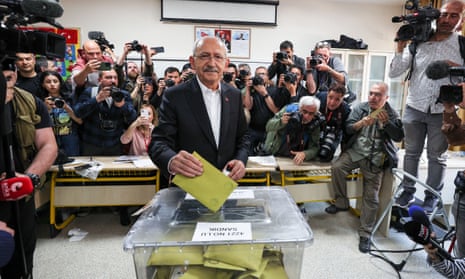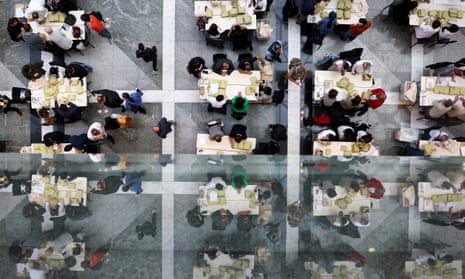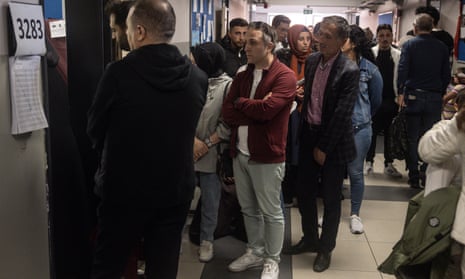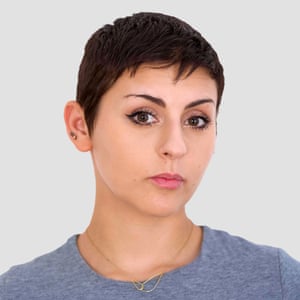Key events
Today’s election matters far beyond the borders of Turkey. Under Erdoğan, the country has flexed is military muscle in the Middle East and beyond, launching incursions into Syria, waging an offensive against Kurdish militants inside Iraq and sending military support to Libya and Azerbaijan.
It has also clashed diplomatically with Saudi Arabia, Egypt, the United Arab Emirates and Israel, rowed with Greece and Cyprus over maritime boundaries in the eastern Mediterranean, and been subjected to US arms industry sanctions after buying Russian air defences.
Erdoğan’s closeness to Russia’s president, Vladimir Putin, has led critics to question Turkey’s commitment to its fellow Nato members, which Ankara’s recent reluctance to endorse Sweden and Finland’s membership applications has only reinforced.
Turkey also, however, brokered a deal for Ukrainian wheat exports – underlining its potential role in ending the war. For the EU, defeat for Erdoğan would be strategically welcome but politically tricky, since it might relaunch Turkey’s accession bid.
Here are some agency photographs of today’s voting in Turkey



Polls close
It is now 5pm in Turkey and voting has ended in both the country’s parliamentary and presidential elections.
Under Turkish law, reporting of any results is banned until 9pm local time.
By later this evening we should have a good indication of whether either presidential candidate has cleared the 50% bar necessary to avoid a runoff in a fortnight’s time.
Kemal Kılıçdaroğlu, 74, has headed the main opposition Republican People’s party (CHP) since 2010 and was named the six-party opposition alliance’s presidential candidate in March.
Long stuck in Erdoğan’s shadow, the bookish former civil servant, from a historically repressed Kurdish group, has lost half a dozen national elections to Erdoğan while leading his secular party.
He entered parliament in 2002 with the CHP, which was established by modern Turkey’s founder Ataturk, and – although he has led the CHP to major victories in big-city municipalities including Istanbul, Ankara and İzmir – has struggled to reach beyond its secularist grassroots to attract conservative voters.
The candidate of the Nation Alliance or Table of Six has been criticised as lacking charisma, and for blocking politicians from his own party – such as high-profile mayors – who may have stood a better chance of victory.
During this campaign, however, Kılıçdaroğlu has struck a more inclusive note, seeking to draw in voters disillusioned by Erdoğan’s rhetoric and perceived economic mismanagement. He has promised economic prosperity, and greater respect for human rights and the rule of law.
His frank kitchen chats with voters have belatedly turned him into something of a social media star. He has also promised to retire after stripping the presidency of Erdoğan’s powers and then “go and spend more time with my grandchildren”.
Kılıçdaroğlu’s promise to “bring spring … and serenity to this land” has attracted younger voters as well as a broad cross-section of Turks exhausted by the outgoing president’s culture wars and harsh, polarising rhetoric.
He has also pledged to release many of the popular figures jailed by Erdoğan’s government in the wake of a failed but bloody 2016 coup attempt as part of his objective of ending what he has called the president’s “one-man regime”.
The country’s most powerful leader since Atatürk, who founded modern Turkey a century ago, Recep Tayyip Erdoğan, a devout 69-year-old, has steered Turkey steadily away from secularism, glorifying its Islamic past – and embracing chaos on the way.
He rose to power 20 years ago as Turkey emerged from a period of rampant inflation, promising sound government, and at the height of his success, Turkey enjoyed a protracted economic boom.
But economists blame Erdoğan for the country’s current economic crisis, saying his insistence on low interest rates has sent inflation soaring – to 85% last year – and caused the Turkish lira to lose 80% of its value against the dollar in five years.
Erdoğan has logged more than a dozen election victories and survived an attempted coup in 2016, shaping the country to his vision of a pious, conservative society and assertive regional player. In 2018 he abolished its parliamentary system, centralising power in an executive presidency.
From his 1,000-room palace outside Ankara, Erdoğan in effect dictates government policy and, critics say, has eroded democracy, stifling dissent and bringing media and judges under his sway. His supporters argue he has saved the country from serious security threats.
Abroad, Turkey under Erdoğan has flexed its military muscle in the Middle East and beyond, launching offensives in Syria and squabbling incessantly with Greece. His interventions in Libya and Nagorno-Karabakh swung the outcomes of complex great-power conflicts.
His courtship of Russia has upset Washington, and his sale of weapons to Ukraine has irritated the Kremlin. But he has always seemed to know how to play one off the other so as to appear like the consummate statesman to his domestic audience.

Ruth Michaelson
Ruth Michaelson and Deniz Barış Narlı are in Istanbul for the Guardian. Ruth has just sent this early dispatch on the atmosphere as Turks went to the polls:
The mood at some of the polling stations in Istanbul was sharply divided, with AKP voters stating they were determined to re-elect Recep Tayyip Erdoğan and rebuffing concerns about the economy or the risk he could lose.
Many mentioned a need for the country to remain united despite the deep political polarisation that has overtaken Turkey throughout the past decade and fears that Erdoğan or his Justice and Development party (AKP) could demand people take to the streets if they lose, or if the vote is close.
“We will do what justice and fairness require,” said 51-year-old Veysel Isinal, asked if he would take to the streets if the AKP demanded it. “I believe the president will win re-election – if he doesn’t that would be bad for the country.”
Younger voters, however, were determined to vote for anyone other than Erdoğan or the AKP. A group in their mid-20s standing in the middle of Erdoğan’s home district in Istanbul, where he campaigned just yesterday, said gen Z would be the generation to end his 20-year reign.
Kurdish voters, courted by the opposition leader Kemal Kılıçdaroğlu, were jubilant about the prospect of ending Erdoğan’s reign. “This time he’s going,” one said, laughing happily with several friends who had turned out to vote.
The basics: who is standing, and how do the votes work
Turkey’s president, Recep Tayyip Erdoğan, and his Justice and Development party (AKP) face their greatest political challenge yet.
Amid an economic crisis, and months after earthquakes killed more than 50,000 people and displaced millions more, today’s elections – presidential and parliamentary – will decide who leads the country where it heads next.
Erdoğan has championed religious and conservative social values at home, while asserting Turkey’s influence in the region and loosening its ties with the west.
Kemal Kılıçdaroğlu of the secularist Republican People’s party (CHP), is standing for the six-party Nation Alliance. He has pledged to prioritise justice, corruption and education.
In the presidential election, any candidate who wins more than 50% of votes in the first round is elected president. If no one secures a majority, the election goes to a runoff – due on 28 May – between the two leading candidates.
In the parliamentary elections, the number of seats a party wins in the 600-member parliament is directly proportional to the number of votes it receives, providing it gets – alone or as part of an alliance – at least 7% of the national vote.
The year’s most important election?
Hello and welcome to the Guardian’s live coverage of what many of the world’s media and pundits have had no hesitation in describing as the most significant election of 2023.
It’s easy to see why: Turkey’s president, Recep Tayyip Erdoğan, leader for the past 20 years of a country of global economic and strategic importance, could be on the way out.
Polls increasingly show Kemal Kılıçdaroğlu, the unity candidate for six opposition parties, with a narrow lead over Erdoğan – possibly scoring above the 50% needed to win outright.
Over two decades, an increasingly authoritarian Erdoğan has taken control of many of Turkey’s institutions – including much of the media and judiciary – steadily sidelining his opponents.
Kılıçdaroğlu aims to reverse many of those policies, including Erdoğan’s all-powerful executive presidency, return power to parliament, slash inflation and improve relations with the west.
The stakes are high: Turkey, a country of 85 million people at the crossroads between Asia, Europe and the Middle East, could continue its democratic slide, or reverse the damage.
We’ll be bringing you all the latest news as it happens: polls close an hour from now, at 5pm local time (2pm GMT), and we could have an early indication of the result by 9pm local time.

